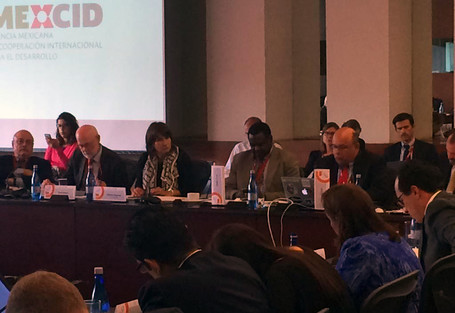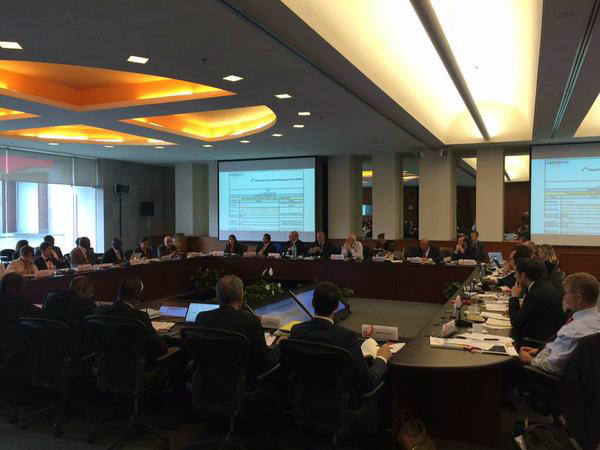
The Global Partnership for Effective Development Cooperation (GPEDC) Steering Committee met on 3 and 4 September in Mexico, hosted by the Mexican Minister of External Relations. UCLG Champion on Development Cooperation, Berry Vrbanovic, Mayor of Kitchener and Vice-Treasurer of UCLG, supported by the CIB Working Group Secretariat, attended the meeting on behalf of the local and regional governments constituency, which was also represented in this forum by the UCLG World Secretariat and FOGAR.
The Steering Committee convened to discuss the ways in which the GPEDC can ensure the new Sustainable Development Goals (SDGs) will be achieved through effective development cooperation. The monitoring exercise on effective development cooperation to take place in 58 countries and the preparations for the upcoming High-level Meeting in Kenya (November 2016) were also on the agenda.
The role of the GPEDC in achieving the SDGs
The Dutch Co-Chair Ms Ploumen, Minister for International Trade and Development Cooperation, called on the members of the Steering Committee to strengthen the focus of the Global Partnership on knowledge sharing and learning, particularly with a view to effectively implementing the Sustainable Development Goals (SDGs). Steering Committee members highlighted that effective multi‑stakeholder partnerships will be crucial to the attainment of the goals, as well as the need for genuine broad-based ownership of development processes.
Local governments request meaningful participation
 UCLG representative Mayor Vrbanovic recalled the importance of ensuring the Partnership’s focus on monitoring the quality of development cooperation in order to make significant contributions to the New Development Agenda, which will be approved in New York this month. He further requested more recognition for the important role that local governments play in all processes of the GPEDC. He also highlighted the importance of including local governments and other stakeholders in the national dialogues on defining and implementing national development strategies.
UCLG representative Mayor Vrbanovic recalled the importance of ensuring the Partnership’s focus on monitoring the quality of development cooperation in order to make significant contributions to the New Development Agenda, which will be approved in New York this month. He further requested more recognition for the important role that local governments play in all processes of the GPEDC. He also highlighted the importance of including local governments and other stakeholders in the national dialogues on defining and implementing national development strategies.
This plea was echoed by various stakeholders, such as CSOs, parliamentarians and trade unions. The European Commission representative, Klaus Rudischauser called for a group of pilot countries in which this model would be implemented. This proposal was supported by the Steering Committee members. El Salvador has already made progress on such a model and could be an example in this regard.
Mayor Vrbanovic also held meetings with civil society representatives and expressed UCLG’s commitment to collaborate with all stakeholders.
Looking towards the future
The local and regional governments constituency will continue to support this agenda by:
- promoting the localization of the SDGs as part of the effective development cooperation agenda;
- providing overviews of good examples and challenges relating to how local governments are or should be included in the definition and implementation of national strategies, and in ensuring the participation of local governments in the upcoming monitoring round on the commitments of the Partnership for Effective Development Cooperation;
- organizing a preparatory session for local governments prior to the High‑level meeting in Kenya (November 2016) and ensuring an active local governments delegation in Kenya;
- continuing the strategic partnership with CSOs, parliamentarians and trade unions.
Background
The Global Partnership for Effective Development Cooperation (GPEDC) was established during the Fourth High-level Forum (HLF4) in Busan (2011) to ensure that development cooperation has the maximum possible impact on development results. The Partnership succeeded the Paris Declaration on Aid Effectiveness (2005) and the Accra Agenda for Action (2008). The discussion on effective development resulted from the wish to ensure greater impact from development cooperation and a more efficient achievement of the Millennium Development Goals (MDGs). Whereas the MDGs were the “what”, the Aid and Development Effectiveness Agenda tried to define “how” they could be achieved. The current Partnership is supported by OECD and UNDP and chaired by Malawi, Mexico and The Netherlands. UCLG/FOGAR have had a joint seat in the Steering Committee since April 2014. Efforts have been made by UCLG/FOGAR to promote the role of local and regional governments in development, and decentralized cooperation as effective mechanism through which they can be strengthened, with the active participation of the UCLG Committee on Development Cooperation and City Diplomacy and its CIB Working Group.










